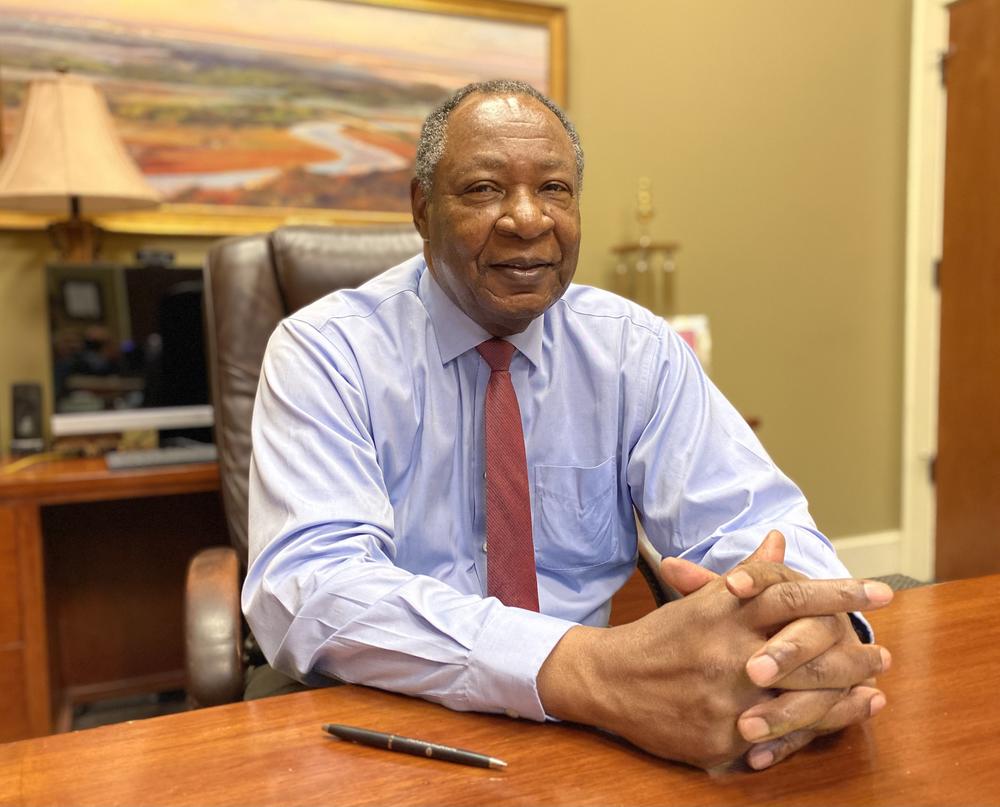
Caption
Bob James, the outgoing president and CEO of Carver State Bank in Savannah, sits in his office at the bank's main branch on Martin Luther King Jr. Boulevard.
Credit: Benjamin Payne / GPB News
|Updated: January 6, 2023 9:17 AM
LISTEN: Bob James, president of Carver State Bank, one of fewer than 20 Black-owned banks in the nation, is changing roles after more than 50 years. GPB's Peter Biello asks what kept him in the previous role so long.

Bob James, the outgoing president and CEO of Carver State Bank in Savannah, sits in his office at the bank's main branch on Martin Luther King Jr. Boulevard.
When 24-year-old Bob James became president of Savannah's Carver State Bank in 1971, he was one of the youngest bank presidents in the country. Now, after more than 50 years in that role, he says he's ready to hand over the bank's day-to-day operations to his son, Robert James II. Carver State Bank is one of fewer than 20 Black-owned banks in the U.S. and the oldest commercial bank still headquartered in Georgia's oldest city. Bob James spoke with GPB's Peter Biello.
Peter Biello: Congratulations on 50 years with Carver State Bank. Why have you decided to scale back your role in the company now?
Bob James: Well, I was named president when I was 24, and then I had a birthday in November, and I took over on Dec. 1, 1971. So I was actually 25 years old when I actually started working as president. But it's been an interesting journey. I have managed to keep Carver safe. My son has become extremely involved in the bank. He's an attorney, so he's migrating into the bank. He was a part of our succession plan for many years. So he's taking a more prominent role. So my role has definitely changed.
Peter Biello: But you'll stay involved, it seems. What's been the most rewarding aspect of running this bank for you over the past 50 years?
Bob James: We have a unique mission. When other financial institutions were making decisions to scale back their services to inner city neighborhoods and low-income people, we did exactly the opposite. We figured out how to aggressively provide valuable services to low- and moderate-income neighborhoods. And we've served low-income African-American populations. And so I take great pride in the fact that we have been effective in that service. We have stayed true to our mission and we have been successful.
Peter Biello: What role do Black-owned banks in particular play in the communities that they serve?
Bob James: Well, interestingly enough, most of the mainstream financial institutions have over the years abandoned low-income people. They have found that it's far more profitable to serve middle- to upper-income individuals and mid-sized to large businesses. And so what has happened is that you have an absence of retail banking operations in these neighborhoods. During the last recession, most of the rural banks failed. So you had counties in the state of Georgia with no real retail banking operation. So that means that a farmer or a small business person in a rural area in the state of Georgia did not have a local bank that they could go to. And then — then after the local bank sold out or merged, the larger institutions that bought those institutions did not put individuals in charge who could make decisions. So people who normally had good banking relationships with the banker who could actually approve credits and approve their business transactions, there was no such person in that community any longer. So our banks, the African American banks, have stayed true. We have stayed in our communities. That's been the difference that we have made.
Peter Biello: You've had offers to sell your state charter over the years, but you've turned them down. Why have you turned them down?
Bob James: We turned them down because most of the people who wanted to purchase said they wanted the charter, but they didn't want the mission of this institution. Their interest was in enhancing shareholder value. So they would they would not have wanted to serve the market that we serve.
Peter Biello: To some extent, is that why you stayed on the job for 50 years? I mean, there aren't many people who stay in any job for 50 years. Were you intent on keeping the mission alive?
Bob James: Well, yes. That mission has been my driving force since I got into banking. So, yes, this is that mission has kept me in this job.